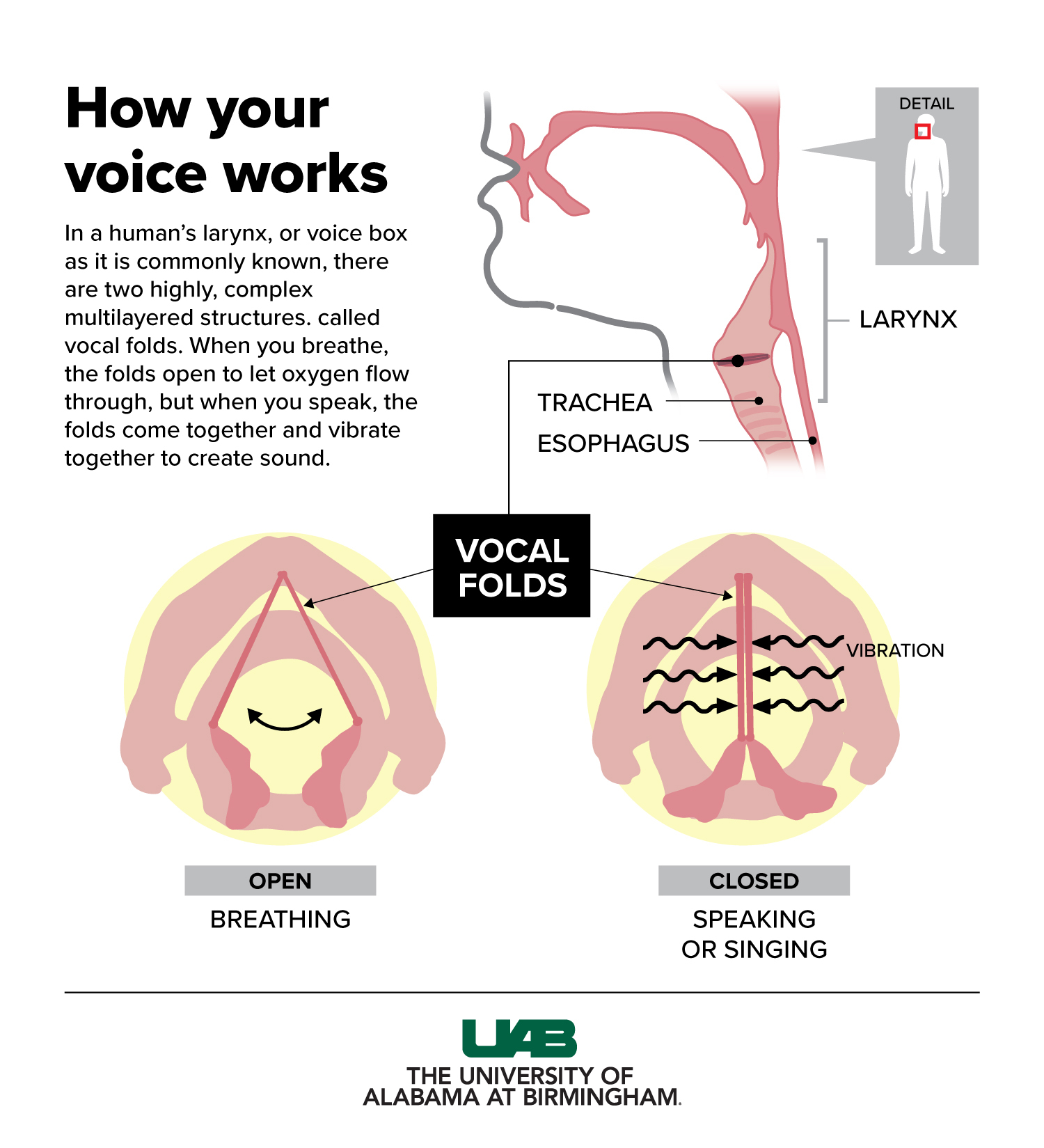 Tea, honey and voice rest. All things to bring a voice back. But do they work, and what causes one to lose their voice? Allergies, a cold, singing at the top of your lungs at a concert — these are all reasons that someone could lose their voice. But, what about those times when you wake up without a voice for no reason? The University of Alabama at Birmingham’s Bharat Panuganti, M.D. a laryngeal surgeon and assistant professor in the Department of Otolaryngology, explains why one can lose their voice and what to do if it happens.
Tea, honey and voice rest. All things to bring a voice back. But do they work, and what causes one to lose their voice? Allergies, a cold, singing at the top of your lungs at a concert — these are all reasons that someone could lose their voice. But, what about those times when you wake up without a voice for no reason? The University of Alabama at Birmingham’s Bharat Panuganti, M.D. a laryngeal surgeon and assistant professor in the Department of Otolaryngology, explains why one can lose their voice and what to do if it happens.
Vocal folds
In a human’s larynx or voice box, as it is commonly known, there are two highly complex, multilayered structures called vocal folds. When you breathe, the folds open to let oxygen flow through; but when you speak, the folds come together and vibrate to create sound.
“Just as you can injure your knee or elbow when playing football, you can injure your vocal folds when talking or singing,” Panuganti said. “Injury to the folds can be a cause of losing your voice, but the timing of the lost voice could be an indicator to the cause.”
Time frame
When a voice is lost, it can happen suddenly or it can happen over the course of weeks and months. The time frame makes a difference as to what the cause of the lost voice may be.
“If you go to a concert and scream for three hours, the next morning you may wake up without a voice,” he said. “The reason for this instant loss of voice could be an injury such as the swelling of the folds or even a bleed of the blood vessels in the folds.”
Vocal folds need to vibrate smoothly against each other, and when there is swelling or a bleed of the vessels, it can cause a change in vibration, leading to the loss of sound. However, Panuganti says, if the loss of voice is gradual overtime, it could indicate a more serious condition.
“If you have voice loss that is progressive over the period of weeks or months, that raises concern,” he said. “If you are experiencing this, I recommend seeing a laryngologist to rule out a benign mass on the folds, also known as nodules, or larynx cancer. Timing is key.”
Voice loss due to illness
During a cold, several things can cause one to lose their voice. If extra mucus is being created, it can coat the vocal folds, preventing them from having a smooth vibration, which can lead to a raspy sound or even loss of voice. Coughing due to illness can also cause swelling of the folds, which can prevent noise from being produced.
“If a patient loses their voice every time they get a cold, it could be that they have vocal fold scarring,” he said. “Scarring of the folds, which can be confirmed with a scope exam, could make a patient lose their voice even with the smallest amount of swelling.”
 Click image to enlarge.
Click image to enlarge.
Graphic by: Jody PotterUnfortunately, Panuganti says, there is no absolute cure for vocal fold scars.
“There is a thin layer in the folds that is responsible for the vibration of the folds, and once that layer is gone, it is gone forever. We produce that layer as we develop, and production stops once we become adults,” he said. “We are actively exploring methods to overcome changes in vibration related to scarring and loss of this layer, and we encourage patients to consider coming in for an evaluation if they are concerned about their voice.”
Home remedies
Just as a doctor would recommend rest for a knee injury, voice rest could help those who have lost their voice due to an acute injury such as coughing or a bleed as it gives the folds time to heal without being used.
“There is a lot of information on the internet about teas and hydration curing voice loss. While this is good for overall throat hygiene, which could not hurt, it may not help to recover your voice faster.”
Those experiencing voice loss due to a cold can look to three home remedies to help ease symptoms — hydration, humidifier and decongestants. Panuganti says hydration and decongestants can help thin the mucus, while a humidifier makes the environment of the throat more moist and can cause mucus to stick to the surface of the vocal folds less.
Myth busting
Many have heard to not whisper when you lose your voice as it will only strain it more, or the opposite: to whisper instead of talking to rest the voice. Panuganti says this is a common misconception that is not entirely accurate.
“When you talk, your vocal folds vibrate against each other to produce sound, and the frequency could happen 100 to 300 times per second. The frequency depends on the pitch of your voice, not necessarily the volume with which you are voicing, ” he said. “This vibration will happen whether you are talking softly or loudly. So when we advise voice rest, it means to rest the use of your vocal folds, which includes whispering.”
The UAB Voice Center is a state-of-the-art interprofessional center providing innovative diagnostic and therapeutic care for people with voice, swallowing and airway problems. The center is the only voice center in the state of Alabama and is recognized as one of the few truly interprofessional centers in the United States. To find a provider in otolaryngology, click here.